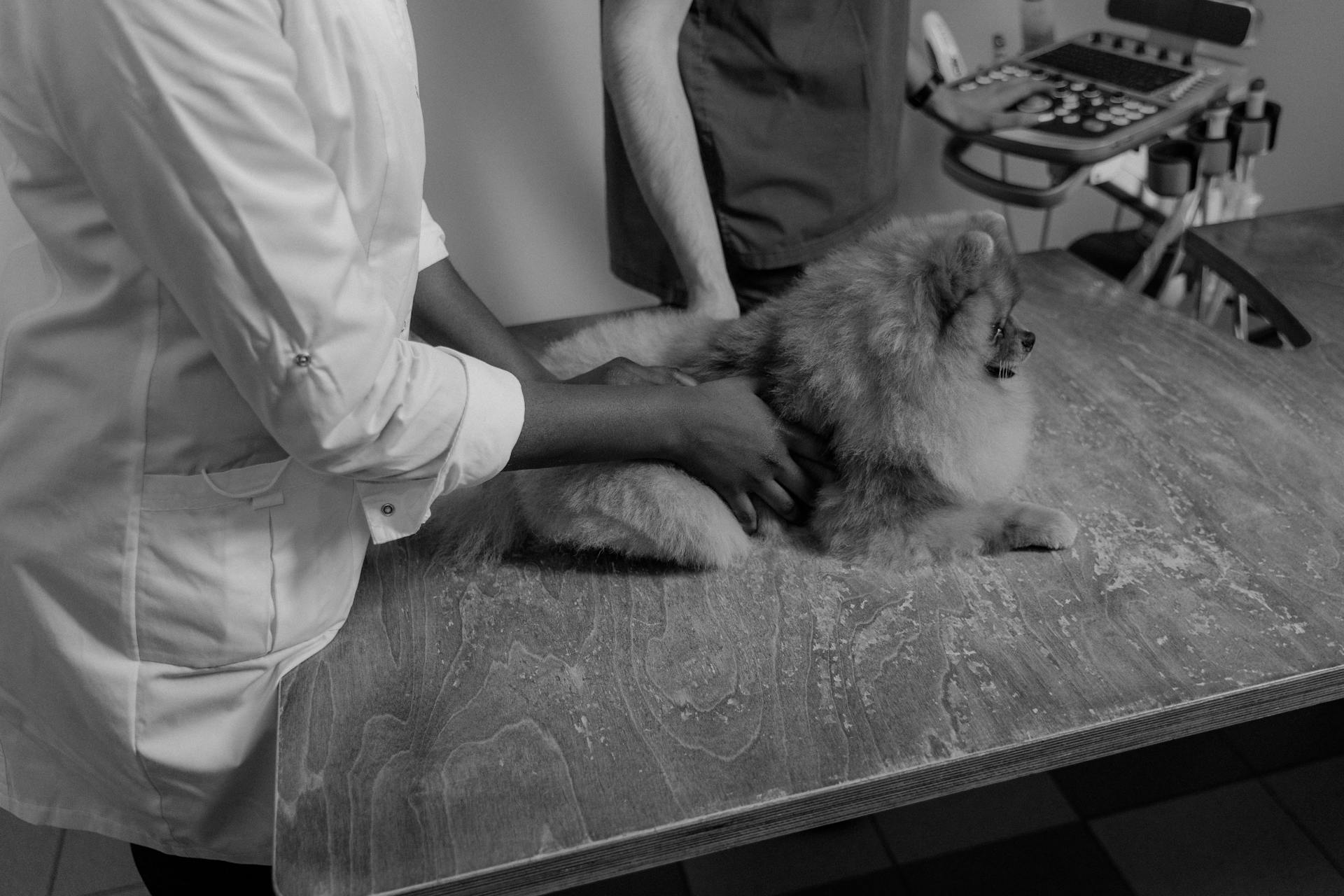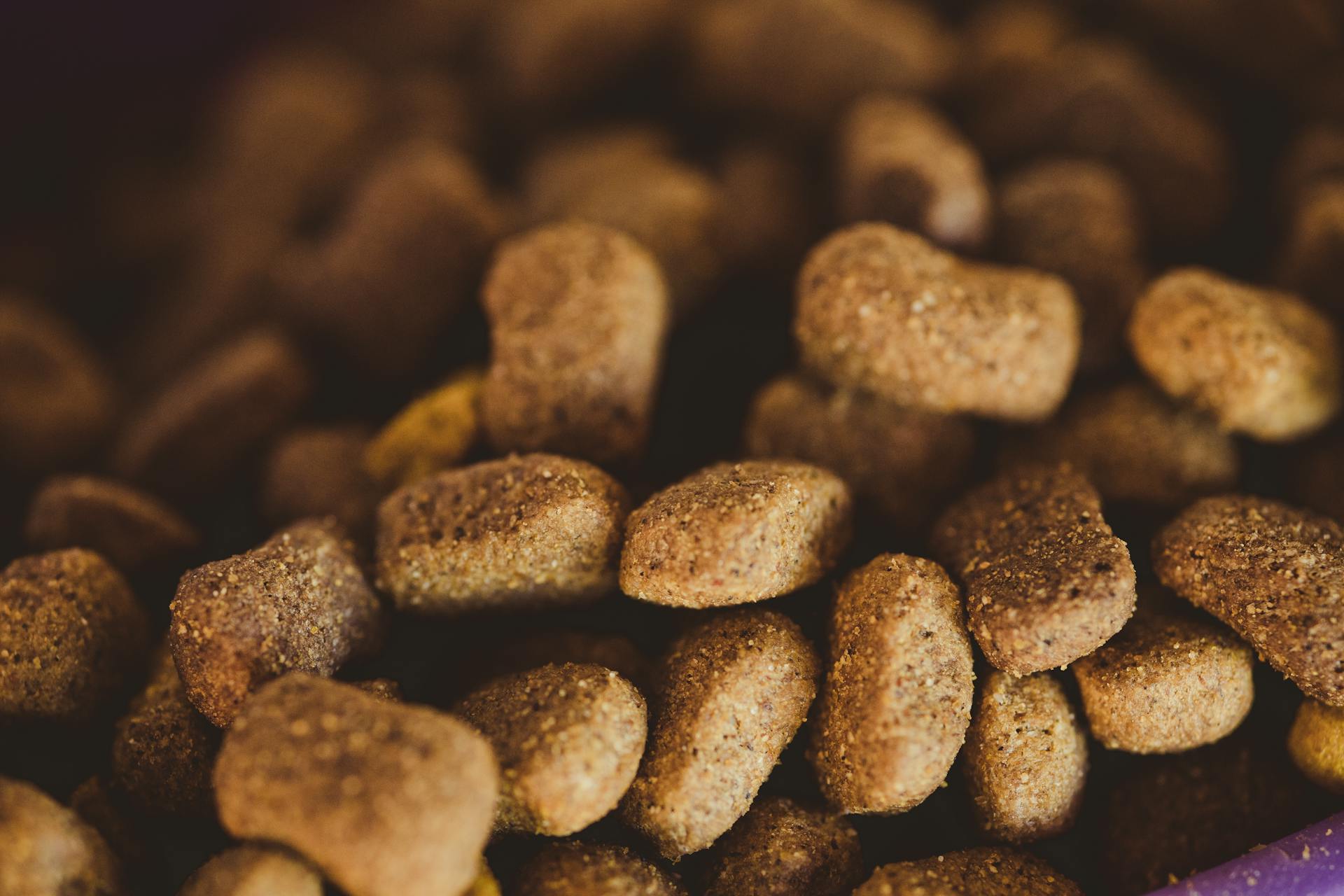
Your dog's gut health is crucial for their overall well-being. A healthy gut microbiome can boost their immune system, improve digestion, and even influence their mood.
A dog's gut is home to trillions of microorganisms, with some research suggesting that a balanced gut microbiome can account for up to 70% of the immune system. This is why maintaining a healthy gut is essential for preventing illnesses and infections.
Feeding your dog a high-quality diet rich in fiber can help promote a balanced gut microbiome. A diet high in fiber can increase the production of short-chain fatty acids, which are essential for gut health.
A dog's gut health can also be affected by their environment, with stress and changes in their routine potentially disrupting the balance of their gut microbiome.
Benefits of Probiotics for Dogs
Probiotics are a cornerstone of preventative care for dogs. They boost healthy gut bacteria that help digest food, and are a well-known therapy for diarrhea and gastrointestinal upset. Probiotics can even counter urinary tract infections, immune system disorders, and anxiety.
Probiotics have been found to help with mental health, as the gastrointestinal tract and brain are in constant contact. Proper microorganisms in the intestines can help with mental and emotional regulation.
Dogs who took the bacterium BL999 were less likely to bark, jump, spin, or pace in situations that normally caused them distress. They were also more likely to explore a new environment.
Probiotics can be given proactively if you know a stressful event is coming up, such as boarding while you're on vacation or moving. Start giving the probiotics several days in advance so that your dog already has an ideal gastrointestinal tract.
You can also give probiotics daily as part of your dog's long-term health care.
Here are some conditions that may benefit from probiotic treatment:
- Allergies
- Anxiety
- Bad breath
- Coat quality
- Diarrhea
- Immune disorders
- Intestinal inflammation
- Irritable bowel syndrome
- Liver disease
- Obesity
- Skin disorders
- Urinary tract infections
Some probiotic species beneficial to dogs include:
- Bacillus coagulans
- Bifidobacterium animalis (strain AHC7) helps with acute diarrhea
- Bifidobacterium bifidum
- Bifidobacterium longum (BL999) helps with anxiety
- Enterococcus faecium (strain SF68)
- Lactobacillus acidophilus improves stool quality and frequency
- Lactobacillus casei
- Lactobacillus plantarum
- Lactobacillus rhamnosus (strain LGG) may be effective for diarrhea
Prebiotics are dietary fibers that act as food for probiotics in the gut. Prebiotics are essential to a thriving microbiome, and can help your pet stay "regular" and absorb nutrients.
Factors Influencing Gut Health
Your dog's gut health is a dynamic and intricate system, influenced by several factors. The gut health of your dog is a complex process that's shaped by various elements.
Diet plays a significant role in shaping your dog's gut microbiome. Foods to Help Level Your Dog's Gut Bacteria include eggs, berries, and sweet potatoes. These foods can help balance out your dog's gut bacteria.
Other factors that influence your dog's gut health include the types of food you feed them. Experts recommend avoiding starchy grains and opting for vegetable and legume starches like potatoes and sweet potatoes instead.
Age
As we age, our dietary needs change. Older dogs often need more of certain nutrients, such as those that support joint health.
Our metabolism tends to slow down with age, which affects how our bodies process food. This means that adjustments need to be made in diet.
Adding supplements to an older dog's diet can help their bodies adjust to age or infirmities that come with age. This can be especially important for dogs with joint issues or other age-related health problems.
For another approach, see: Older Dog Odor
Breed Matters
Different breeds have different metabolisms, which can impact their gut health.
Some breeds have specific dietary requirements that must be met to keep their gut bacteria in balance.
If you have questions about your specific breed's requirements, talk to your vet.
Consider reading: Healthiest Dogs Breeds
Factors Influencing Your Microbiome
The gut health of our furry friends is a complex system influenced by several factors. The gut microbiome of your dog is a dynamic and intricate system, influenced by several factors.
Diet plays a significant role in shaping the microbial diversity within your dog's gastrointestinal tract. Experts recommend incorporating certain foods to help level out your dog's gut bacteria.
Here are some foods that can help promote a healthy balance of gut bacteria:
- Eggs
- Berries
- Broccoli, Brussels sprouts and cabbage (run through a food processor)
- Sweet potatoes
- Pumpkin
- Whitefish
- Lean turkey and chicken (avoid processed meats)
Foods high in starchy grains can be acidifying and inflammatory, whereas vegetable and legume starches like potatoes, sweet potatoes, and lentils are generally considered safer options.
Maintaining a Healthy Gut
Eggs are a great food to help level out your dog's gut bacteria.
Some experts recommend feeding your dog berries as a way to support their gut health.
Broccoli, Brussels sprouts, and cabbage can be a nutritious addition to your dog's diet, especially when run through a food processor to make them easier to digest.
Sweet potatoes are a non-inflammatory and non-acidifying food that can be beneficial for your dog's gut health.
Pumpkin is another food that can help support your dog's gut health.
Whitefish is a lean protein that can be a healthy addition to your dog's diet.
Lean turkey and chicken are also good options, but be sure to avoid processed meats.
Here are some examples of gut-friendly foods to consider adding to your dog's diet:
- Eggs
- Berries
- Broccoli, Brussels sprouts, and cabbage (run through a food processor)
- Sweet potatoes
- Pumpkin
- Whitefish
- Lean turkey and chicken
It's essential to check whether a food is safe for dogs before feeding it to them.
Identifying and Addressing Issues
Dogs can be intolerant to ingredients like gluten, eggs, and dairy, which can cause gut health issues. Consider asking your vet to conduct an allergy test to rule out undetected intolerances or food allergies.
Common symptoms of poor gut health in dogs include vomiting, regurgitation, weakness and fatigue, changes in appetite, frequent flatulence, constipation, weight loss, and blood or mucus in the stool. If you notice any of these symptoms, it's a good idea to bring your pet to the vet.
Some specific signs of poor gut health in dogs include flatulence, vomiting, diarrhea, constipation, loss of appetite, bloating in the stomach area, inability to get comfortable, and change in gait. Regularly seeing your dog experience any of these symptoms could indicate an imbalance in their gut health.
Here are some common symptoms to watch out for:
- Vomiting
- Regurgitation
- Weakness and fatigue
- Changes in appetite
- Frequent flatulence
- Constipation
- Weight loss
- Blood or mucus in the stool
Causes of Damage
Damage to a dog's gut health can be caused by various factors, and it's essential to understand these causes to address the issue effectively. Food allergies and chronic malnutrition are two common causes, which can lead to a damaged gut.
Extended use of some anti-inflammatory medications can also disrupt the gut microbiome. Food intolerances, often resulting from consuming the same processed foods over long periods, can further damage a dog's gut.

If your dog experiences gastrointestinal issues or a vet checkup reveals an imbalance in the gut microbiome, it's crucial to take action to restore a healthy digestive system.
Here are some common causes of damage to a dog's gut health:
- Food allergies
- Chronic malnutrition
- Extended use of anti-inflammatory medications
- Food intolerances
These causes can lead to a range of problems, including inflammation, weight gain, and digestive issues. By understanding the underlying causes, you can take steps to address the issue and promote a healthy gut in your dog.
Checking for Intolerances and Allergies
If your dog's gut health is out of balance, it might be due to an undetected intolerance or food allergy. Consider asking your vet to conduct an allergy test.
Some common ingredients that dogs can be intolerant to are gluten, eggs, and dairy. Cutting out an allergen might transform your pup's gut health.
Dogs can develop conditions like Celiac disease if they have a gluten intolerance.
Signs and Symptoms
If you notice any of the following symptoms, it's a good idea to bring your pet to the vet. They may be a sign of poor gut health, whether it's an easily treatable bacterial imbalance or a more serious disease like pancreatitis.
Vomiting, regurgitation, and frequent flatulence are all common symptoms of digestive issues in dogs. If you're seeing your dog experience any of these on a regular basis, it could be a sign there is something out of balance with their overall gut health.
Changes in appetite, weakness and fatigue, and weight loss are also possible signs of digestive troubles. If you notice any of these symptoms, it's a wise idea to bring your pet to the vet.
Here are some common symptoms of digestive issues in dogs:
- Flatulence
- Vomiting
- Diarrhea
- Constipation
- Loss of appetite
- Bloating in the stomach area
- Inability to get comfortable
- Change in gait
Irregular bowel movements, such as diarrhea or constipation, are a telltale sign of gut health problems in dogs. Dogs may also experience vomiting due to any number of conditions related to gut health.
Frequently Asked Questions
How do you reset your dog's digestive system?
To reset your dog's digestive system, try a combination of fasting, bland diet, and fiber-rich foods, while also introducing electrolytes and probiotics to support gut health. This holistic approach can help restore balance and alleviate digestive issues in your furry friend.
How do you check a dog's gut health?
We check a dog's gut health by analyzing a pea-sized sample of their poop for bacterial DNA, then comparing it to a healthy reference set. This process helps identify the different types of bacteria living in your dog's gut.
Sources
- https://www.vet.cornell.edu/departments-centers-and-institutes/riney-canine-health-center/canine-health-information/power-probiotics
- https://vetericyn.com/blog/dog-gut-health/
- https://nativepet.com/blogs/health/5-steps-to-improve-your-dog-s-gut-health-naturally
- https://www.supremesourcepet.com/dog-gut-health/
- https://rawznaturalpetfood.com/dog-gut-health/
Featured Images: pexels.com


